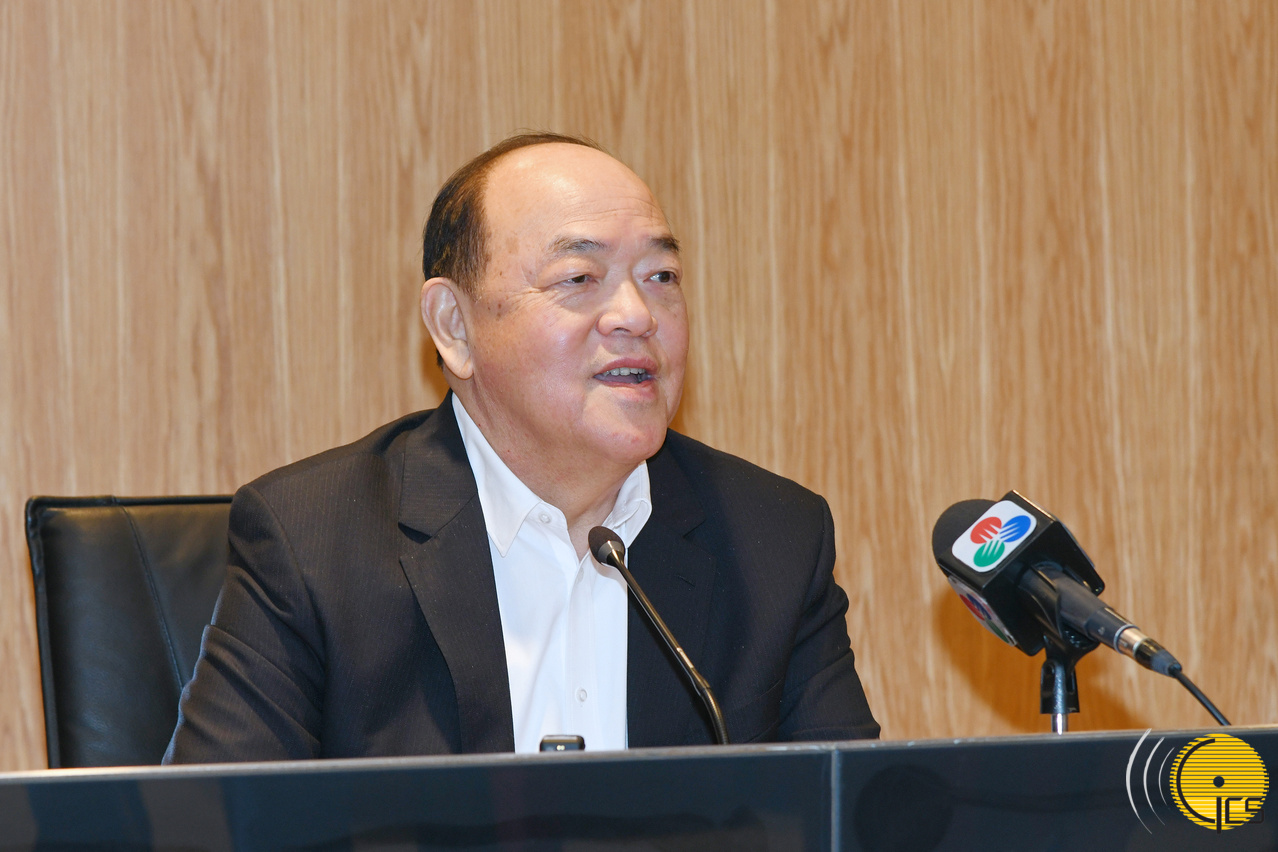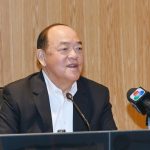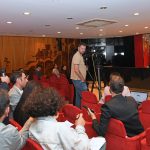 The Chief Executive, Mr Ho Iat Seng, meets the press in Lisbon to conclude his four-day visit to Portugal.
The Chief Executive, Mr Ho Iat Seng, meets the press in Lisbon to conclude his four-day visit to Portugal.
The Chief Executive, Mr Ho Iat Seng, met reporters in Lisbon to conclude his four-day visit to Portugal, and said the trip had marked the start of a new chapter in Macao-Portugal friendship and cooperation. In particular, it had bolstered cooperation and exchanges in matters related to economics and trade, technological innovation, healthcare, culture, and study of the Portuguese language.
The press event took place in the morning local time on Saturday (22 April). Mr Ho has been leading a Macao Special Administrative Region (MSAR) Government delegation, and a group of Macao entrepreneurs, on a visit to the country. The MSAR Government delegation is to travel on to Luxembourg, and Brussels in Belgium, before returning to Macao on 27 April.
In his comments to the press, Mr Ho noted that Portugal was the first overseas country to be visited by members of the current-term MSAR Government, since the COVID-19 pandemic. The trip honoured the profound and long-standing friendly ties between Macao and Portugal. The two sides had seen growing cooperation in various areas. Macao had given increasing attention to its important role as a commercial and trade cooperation service platform between China and Portuguese-speaking countries. The Macao-based Forum for Economic and Trade Cooperation between China and Portuguese-speaking Countries (Macao) would mark its 20th anniversary later in the year.
The Portugal trip had been an opportunity to explain to people overseas the fresh development opportunities available in Macao under the new situation. The trip also aimed to complement the city’s overall effort regarding appropriate economic diversification.
While in Lisbon, Mr Ho had meetings with respectively, the President, the Prime Minister, and the Minister of Foreign Affairs of the Portuguese Republic; with the Ambassador of China to Portugal; and with the Mayor of Lisbon. The conclusion drawn from each of these meetings was that Macao and Portugal should continue to deepen cooperation, and explore new opportunities relating to economics and trade, innovation in science and technology, healthcare, and culture.
Macao’s platform role, plus the prospects of the Guangdong-Macao Intensive Cooperation Zone in Hengqin, had presented Macao with huge opportunity for development, said Mr Ho. Therefore, he had – when meeting Portugal’s President, Prime Minister, and other officials – shared detailed information about the Guangdong-Hong Kong-Macao Greater Bay Area, and the Cooperation Zone, and had in-depth conversations regarding how entrepreneurs in Macao and in Portugal could explore jointly opportunities via those initiatives.
The Chief Executive had invited Portugal’s Minister of Foreign Affairs to visit Macao to help host the seventh meeting of the Macao-Portugal Joint Committee.
In addition, Macao was striving to organise, within this year or next year, an in-person edition of the Ministerial Meeting of theForum for Economic and Trade Co-operation between China and Portuguese-speaking Countries, and had invited The Government of Portugalto send a delegation to attend the meeting in Macao, once the event date was finalised.
During Mr Ho’s meeting with the Mayor of Lisbon, Mr Carlos Moedas, the two officials had exchanged ideas on technological innovation, municipal administration, the study of Portuguese language, and bilateral cooperation. Mr Ho said municipal administration was a crucial element in the work of the MSAR Government. Lisbon’s experience of using technology for administration tasks would be a reference point for Macao.
Study in Macao of the Portuguese language had also been discussed with officials from the Government of Portugal, said Mr Ho. Portuguese is one of the two official languages of Macao, and the MSAR Government had always given its strong support to the teaching of that language.
Of the current 77 non-higher education institutions in Macao, 36 have courses in the teaching of the Portuguese language. Additionally, Macao’s tertiary education institutions have spared no effort in the promotion of Portuguese language and culture, as well as Chinese-Portuguese translation.
The Chief Executive also noted that the visiting delegation was accompanied by Macao entrepreneurs, and officials and entrepreneurs from the Cooperation Zone in Hengqin. Following the Lisbon stop, the Secretary for Economy and Finance, Mr Lei Wai Nong, would lead the Macao entrepreneurs on a visit to Porto. That was in order to offer people there more information on the investment opportunities available in Macao and in the Cooperation Zone.
On Thursday (20 April), the Chief Executive had set aside time to meet the Macao entrepreneurs on the Portugal trip, to review the effectiveness of the visit up to that point.
In that meeting, the entrepreneurs had thanked the MSAR Government for providing them with a platform to reach the Portuguese market, and the markets of other Portuguese-speaking countries. The entrepreneurs also said that they had engaged with Portuguese businesses interested in opportunities available respectively in Macao, the Greater Bay Area, and the Cooperation Zone, and that they looked forward to promoting, while in Portugal and in the future, Macao and the Cooperation Zone.
While in the Portuguese capital, the Chief Executive took part in events and visits relating to the “Big Health” industry; and to the sectors of convention and exhibition, sports, commercial and trade industries; and education.
These activities included: visiting research centre on big health; the Macao-Portugal Investment and Tourism Promotion Conference; the signing of a strategic cooperation framework agreement between the University of Macau and the University of Lisbon; the signing of a memorandum of understanding between the United Nations World Tourism Organization (UNWTO) andthe Global Tourism Economy Research Centre – the organiser of the Global Tourism Economy Forum; and a meeting with UNWTO’s Secretary-General Mr Zurab Pololikashvili.
The Chief Executive also visited the headquarters of CGD Group (Caixa Geral de Depósito, SA) in Lisbon, to explore new opportunities in cooperation relating to modern financial services. Mr Ho gave a briefing on the MSAR Government’s “1+4” approach to appropriate economic diversification, which had modern financial services as one of its pillars.
The recently-promulgated 30 articles relating to financial support for the Cooperation Zone in Hengqin, helped consolidate financial reform and innovation in the Cooperation Zone and promote the integration of Macao and Hengqin.
Representatives of the CGD Group and its subsidiary BNU bank showed interest in expanding their business to the Cooperation Zone in Hengqin, especially providing financial support for nascent industries such as “Big Health”, and for Portuguese pharmaceutical companies. This was with a view to strengthening financial cooperation between Macao and Portugal.
On Wednesday (19 April), the Chief Executive held an exchange session and dinner for Macao young people studying in Portugal.
Mr Ho said the presence in Portugal of those students was an important part of Macao-Portugal cooperation. The MSAR Government would continue to support them and their personal development. It looked forward to seeing them – upon graduation –play their part in the development of Macao, of the Cooperation Zone and of the Greater Bay Area, in order to integrate themselves into overall national development.
In all, the visit to Portugal had been fruitful, said Mr Ho. Not only had it opened up a new chapter for the friendship and ties between Macao and Portugal, following the pandemic, but it had also been helpful in presenting to the international community the successful implementation in Macao of the “One country, two systems” principle. All the efforts made during the visit carried great significance in terms of promoting in the future Macao-Portugal cooperation and exchanges in various fields, added the Chief Executive.



